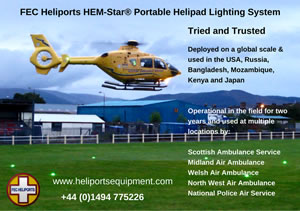QinetiQ2005-11-24 15:54:35
Successful Dubai demo of runway debris detection system
QinetiQ's award winning Tarsier system excels in first Middle East outing
An award-winning radar system developed by QinetiQ that can detect very small items of potentially dangerous debris on airports runways has just completed a successful demonstration at Dubai International Airport. It is the first time the Tarsier system has been trialled in the Middle East and follows the first sale of the system to Vancouver International Airport earlier this year.
The system has previously been demonstrated at London Heathrow and New York's JFK Airport. It has already received recognition by winning the safety category at this year's Aerospace Industry Awards and then scooped the winner's prize in the transportation category of October's Wall Street Journal Innovation Awards.
Over the course of the five day demonstration, the all-weather, 24/7 Tarsier system performed fully automatic detection and location of a variety of representative test debris items such as metal bolts, a small section of a carbon fibre grill and plastic and glass bottles. The demonstration also included the simultaneous real time detection of more than 30 pieces of rubber tyre in a simulated tyre "blow-out�.
Dubai International Airport is one of the fastest growing airports in the world and is also recognised as one of the world's premier aviation hubs. More than 100 airlines use the airport which serves in excess of 160 destinations worldwide.
Commenting on the trial, Mohammed Ahli, Operations Director at Dubai, said: "Runway safety is an absolute priority for Dubai International Airport and, despite an excellent safety record, we are continually looking for ways of minimising potential risks. Tarsier performed very well during this important trial and we look forward to continuing our dialogue with QinetiQ about potential installation of the system.�
Debris on runways is a major safety, cost and operational issue for airports and airlines. The estimated worldwide annual cost of debris damage and delays is $4 billion and a small strip of metal on the runway was a major contributory factor in bringing down Concorde flight AF4590 on 25 July 2000 as it left Paris Charles de Gaulle airport.
Checking for debris is currently performed manually, which is time consuming, expensive and prone to human error. Runways may be inspected only every four hours or more and it can take as long as 45 minutes to check a runway between aircraft movements. Inspections can be particularly difficult in bad weather and at night and can result in runway closures, causing delays in both arrival and departure slots while, most importantly, passenger and staff safety can be at risk. Tarsier can locate runway debris swiftly and accurately without disrupting aircraft movements.
QinetiQ's award winning Tarsier system excels in first Middle East outing
An award-winning radar system developed by QinetiQ that can detect very small items of potentially dangerous debris on airports runways has just completed a successful demonstration at Dubai International Airport. It is the first time the Tarsier system has been trialled in the Middle East and follows the first sale of the system to Vancouver International Airport earlier this year.
The system has previously been demonstrated at London Heathrow and New York's JFK Airport. It has already received recognition by winning the safety category at this year's Aerospace Industry Awards and then scooped the winner's prize in the transportation category of October's Wall Street Journal Innovation Awards.
Over the course of the five day demonstration, the all-weather, 24/7 Tarsier system performed fully automatic detection and location of a variety of representative test debris items such as metal bolts, a small section of a carbon fibre grill and plastic and glass bottles. The demonstration also included the simultaneous real time detection of more than 30 pieces of rubber tyre in a simulated tyre "blow-out�.
Dubai International Airport is one of the fastest growing airports in the world and is also recognised as one of the world's premier aviation hubs. More than 100 airlines use the airport which serves in excess of 160 destinations worldwide.
Commenting on the trial, Mohammed Ahli, Operations Director at Dubai, said: "Runway safety is an absolute priority for Dubai International Airport and, despite an excellent safety record, we are continually looking for ways of minimising potential risks. Tarsier performed very well during this important trial and we look forward to continuing our dialogue with QinetiQ about potential installation of the system.�
Debris on runways is a major safety, cost and operational issue for airports and airlines. The estimated worldwide annual cost of debris damage and delays is $4 billion and a small strip of metal on the runway was a major contributory factor in bringing down Concorde flight AF4590 on 25 July 2000 as it left Paris Charles de Gaulle airport.
Checking for debris is currently performed manually, which is time consuming, expensive and prone to human error. Runways may be inspected only every four hours or more and it can take as long as 45 minutes to check a runway between aircraft movements. Inspections can be particularly difficult in bad weather and at night and can result in runway closures, causing delays in both arrival and departure slots while, most importantly, passenger and staff safety can be at risk. Tarsier can locate runway debris swiftly and accurately without disrupting aircraft movements.
For more information contact:
Cody Technology Park
Room G069, Building A 7
Cody Technology Park, Ively Road
FARNBOROUGH
Hampshire
GU14 0LX
United Kingdom
Tel: +44(0)8700 100 942
